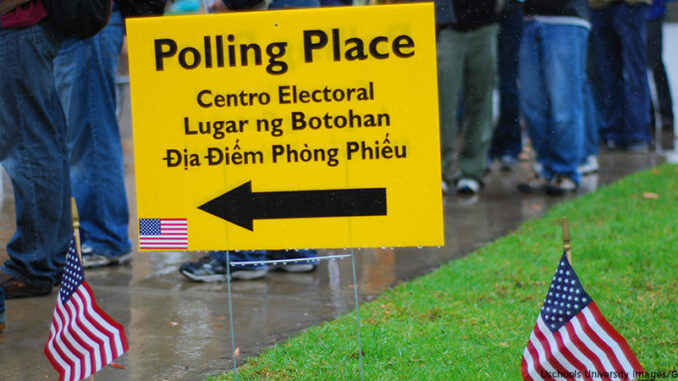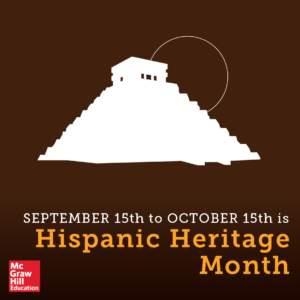
Feliz Mes de la Hispanidad

Hispanic Heritage may be 30 days, but it spans two months. Running from September 15 to October 15, the celebration kicks off to coincide with Independence Day for five Latin American Countries–Costa Rica, El Salvador, Guatemala, Honduras and Nicaragua (with Independence Day for Mexico and Chile following on September 16). Observing the heritage of a particular population means gaining a better understanding about its history, culture, customs and contributions. Sharing a common border that stretches nearly 2000 miles, the United States and Mexico must work together to address challenges such as security and immigration together.
The influence of Hispanics upon America goes back to its earliest days. Christopher Columbus hailed from Spain. Saint Augustine, Florida, the oldest continuously European settlement in North America (years before Jamestown), was founded by another Spanish explorer, Pedro Menendez de Aviles. This means that Hispanics have been in this country longer than any other ethnic group besides the Native Americans. In 1970, Hispanics made up 5 percent of the population of the United States. Today, that number has grown to 17 percent.
What Do You Think? What are some things you could do to celebrate Hispanic Heritage Month (think food, arts or community). Make a commitment to recognize our neighbors both south of the border and across the ocean.
International Peace Day
Thirty years ago, on September 21, the General Assembly of the United Nations declared a day to mark, “the right of peoples to peace.” Also known as International Peace Day, this day promotes the idea that peace is a vital element of human rights. To strengthen their commitment, they voted in 2001 to establish September 21 as a day of cease-fire and non-violence. Events being held all over the world include film screenings, concerts, lectures, art exhibitions and fundraisers. Organizers are looking to implement practical ways to integrate peace into the daily lives of its citizens. Peacecast.tv will broadcast live coverage of music, dance and spoken word celebrations all day long.
A nonprofit organization called Pathways to Peace was established at the same time as the UN resolution. They believe that education is at the foundation of any society whose aim is peace. Their latest major project is a Culture of Peace Initiative (CPI) Peace Commission. Based in Ashland, Oregon in the US, the commission will align its local government, school-district and communities to incorporate strategies such as nonviolent conflict resolution and emphasizing mutual respect into their city planning. Check out the impact they are making at this Web site.
What Do You Think? Mother Teresa once said, “Peace begins with a smile.” What do you think she meant by this? Do you agree? Why or why not? Explain your answer.
Court Battle Over Voter ID Law in Texas
In 1965, President Lyndon Johnson signed the Voting Rights Act into law. It was considered landmark legislation because of its solid anti-discrimination stance. Almost fifty years later, Congress voted to enact an amendment to that law. Introduced in the House of Representatives, HB 3899 set to further enforce the rights already laid out in the 14th and 15th Amendments of the Constitution. Section 5 of the law (originally intended as a temporary measure) required nine states (many of them southern) obtain approval from a federal court if they wanted to make any changes in their voting regulations. In 2012, Congress “gutted” this section, allowing the restricted states more freedom.
One of those states, Texas, is currently engaged in a federal court case regarding the fate of its voter ID law. The state of Texas enacted a law that required voters to have valid ID in order to vote. Supporters say identification is important to deter election fraud. Opponents say that this law is unfair for those without the means to obtain proper documentation (usually those of low-economic status). The plaintiffs in the federal case against Texas want to the state government to have to get proper “clearance” from the federal government as stated under Section 5 of the amended Voting Rights Act.
What Do You Think? Continue to follow coverage of the ensuing legal battles set to take place over this issue. Those covering the case say it is a matter of clashing politics. Do some research and find out if you agree. Why or why not?
Mother Nature Says, “Goodbye Summer!”
What has the weather been like where you live? If you live throughout the western or middle part of the United States you have likely been hit with a sudden onslaught of dangerous weather, including thunderstorms, tornados, flash floods and even snow. Cities like Detroit, St. Louis and Cincinnati were particularly affected, as was a broad swath across Montana and Wyoming. Even Arizona and other desert communities saw historic flooding.
With more attention on the occurrence of climate change, severe weather is no so unexpected. But with such a mild summer, it has been easy to forget how quickly the weather can turn. The recent burst of sudden and harsh weather is being partially blamed on Odile, the hurricane that made landfall over the Baja California peninsula last week. High winds up to 60 mph and powerful thunderstorms are not typically seen in this region of the country. Rainfalls are predicted to reach up to 150mm (42mm is the usual amount expected for the entire month of September), making it the wettest month on record. Beyond flooding, emergency officials are concerned that the run-off water could cause rock and mudslides, which can devastate communities surrounded by mountains.
What Do You Think? Is the upcoming winter going to be a mild of fierce one? Explain your answer.
